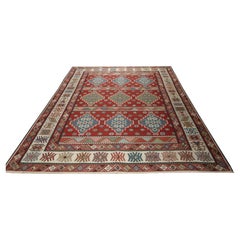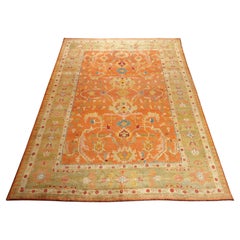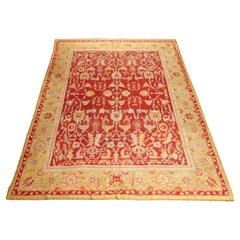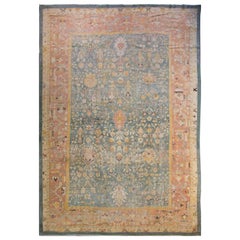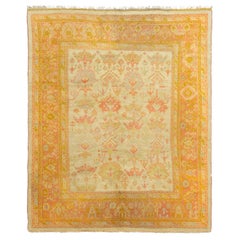Middle East - Turkish Rugs
to
Width
to
Length
to
3
1
2
2
1
3
3
24,087
1,686
3
3
3
2
2
2
2
1
Item Ships From: Middle East
Palatial Pirot Flat-weave Kilim Carpet
Located in Beirut, LB
Native to the town of Pirot in Southeast Serbia, flat-woven carpets form the region an essential functional, cultural, and aesthetic component of the Balkan region. Known for their v...
Category
1920s Serbian Vintage Middle East - Turkish Rugs
Materials
Wool
Radient 19th Century Oushak Carpet
Located in Beirut, LB
Famed for occupying primetime spots in many Old Masters’ paintings of the Renaissance, Anatolian carpets symbolize the West’s first encounter with Oriental carpets at a grand scale.
...
Category
Late 19th Century Turkish Oushak Antique Middle East - Turkish Rugs
Materials
Wool
Radient Antique Oushak Carpet
Located in Beirut, LB
Famed for occupying primetime spots in many Old Masters’ paintings of the Renaissance, Anatolian carpets symbolize the West’s first encounter with Oriental carpets at a grand scale.
...
Category
Early 20th Century Turkish Oushak Middle East - Turkish Rugs
Materials
Wool
Related Items
Amazing Antique Oushak Carpet
Located in Evanston, IL
Pleasant and amazing antique Oushak carpet with unique colors and excellent size with great fine weave.
Ushak rugs have been in production since the...
Category
Late 19th Century Turkish Oushak Antique Middle East - Turkish Rugs
Materials
Wool
Antique Turkish Oushak Carpet
Located in Closter, NJ
Oushak carpets are named after the large town in western Anatolia (Turkey) where they were woven. This town has been a major weaving center for rug production since the reign of the ...
Category
Late 19th Century Turkish Oushak Antique Middle East - Turkish Rugs
Materials
Wool, Cotton
Handmade Carpet Turkish Kilim Rug Flat-Weave Large Vintage Kilims
Located in Wembley, GB
This elegant handwoven wool area rug was constructed in the late 20th century around 1980 in Turkey. The design features cream, brown, blue and rust colours that make up the fantasti...
Category
1980s Turkish Tribal Vintage Middle East - Turkish Rugs
Materials
Wool, Cotton, Natural Fiber, Organic Material
$1,415 Sale Price
20% Off
W 94.49 in L 56.3 in
Vintage Turkish Flat-Weave Kilim
Located in New York, NY
A vintage Turkish flat-woven Kilim rug from the mid-20th century.
Category
Mid-20th Century Turkish Mid-Century Modern Middle East - Turkish Rugs
Materials
Wool
Late 19th Century Turkish Oushak Carpet ( 9' 2'' x 12' 280 x 366 )
Located in New York, NY
Late 19th Century Turkish Oushak Carpet ( 9' 2'' x 12' 280 x 366 )
Category
1880s Turkish Oushak Antique Middle East - Turkish Rugs
Materials
Wool
Contemporary Handmade Turkish Flat-Weave Kilim Large Geometric Room Size Carpet
Located in New York, NY
A modern Turkish flat-weave Kilim large room size carpet handmade during the 21st century with a geometric large scale diamond-shaped pattern in earth tones with an overall khaki gre...
Category
21st Century and Contemporary Turkish Modern Middle East - Turkish Rugs
Materials
Wool
$14,000
W 149 in L 181 in
Contemporary Handmade Turkish Flat-Weave Kilim Colorful Room Size Carpet
Located in New York, NY
A modern Turkish flat-weave Kilim room size rug handmade during the 21st century with a colorful horizontal pattern. A statement piece with its bright and whimsical colors.
Measur...
Category
21st Century and Contemporary Turkish Modern Middle East - Turkish Rugs
Materials
Wool
Mid-20th Century Handmade Turkish Flat-Weave Kilim Accent Carpet
Located in New York, NY
A vintage Turkish flat-weave Kilim accent carpet handmade during the mid-20th century.
Measures: 6' 10" x 9' 7"
Flat-weave rugs & carpets:
Knotted pile rugs are just one small part of a vast universe of textile techniques suitable for heavy use. If you can imagine it, some weaver has tried it out. Pieces can be roughly divided into those reversible from the start and those never, or at least not initially, reversible. Thus, kilims are considered reversible, while everything else is not.
Kilims are tapestry woven rugs with both sides the same, in either slit technique where colors change, or with various methods of avoiding slits. Slit tapestry weave goes back to ancient times and Coptic Egyptian weavers used it for ornaments on garments and larger wall hangings. Slits can be avoided by dovetailing of colors (warp sharing) or by interlocking the wefts. The Navajo weavers of the Southwest practice the first while the Fine shawl weavers of Kashmir and Kerman employed the second. Interlocking produces a one-faced fabric, with smooth and rough, ridged faces. The typical Turkish, Caucasian, or Persian rustic Kilim shows slits, but never long ones. Aubusson French carpets are also slit tapestries and the long color transitions are sewn up as part of the regular maintenance. Some kilims are very Fine. The best antique urban Sehna (Senna) kilims on wool, cotton or silk warps approximate the comparable rugs in refinement and are the most desirable of all Persian kilims. Although the various flatweave techniques are usually expressed in geometric, simple, often repeating, patterns, Sehna kilims demonstrate that even the most intricate designs can be effectively rendered in flat-stich. The term ‘Kilim’ has been extended to cover any pileless, weft-faced heavy textile. Thus, the sectioned and joined northeastern Persian horizontally striped wool rugs are called ‘kilims’. So are the plain-weave end finishes of pile rugs. All these are weft-faced, weft patterned flatweaves.
These sectioned pieces are woven not on a frame loom, but one steadied by the weaver at one end and with the warps fastened down at the other. Only relatively recent have these tribal pieces become available. They are used as floorcoverings, hangings, room dividers, furniture covers. They are mostly bitonal in shades of natural dark brown and beige. Some more recent pieces show weaver innovations with ikat and moire effects. Work proceeds quickly and a skilled weaver can complete a thirty foot strip in almost no time.
Wefts, the elements added as weaving progresses, play an essential part in what is a flatweave. The best-known example of an extra-weft, wrapping technique is on Caucasian and tribal Persian Soumaks, where a pattern weft wraps around the fixed warp, changing as weaving progresses. Soumaks can be large carpets, Kuba in the Caucasus, small bag faces (Caucasian and Persian Shah Savan saddle bags), or cover scatter rugs (Persian Afshars). The Soumak technique is fast, and a weaver can work much more quickly than tying knots. The left-over wefts are cut off on the back, so the front and back are initially different. As a Soumak on the floor gets used, these weft yarns wear away and the two sides converge although the exact texture remains distinct.
There are other ways of pattern by weft. Often on smaller tribal pieces, the pattern weft(s) is (are) part of the weft structure, moving in an out, and holding the whole thing together. These wefts can be complementary or added (supplementary), continuous across the flatweave or cut off as they travel unneeded across the verso. Supplementary weft flatweaves are often very compact and substantial. The nomadic Turkmen and Balouch tribes employ both supplementary and complementary weft techniques on their pieces. Supplementary wefts are often raised on the recto (front) while complementary wefts are flat to the surface. Tribal Kurds employ this extra-wefting technique. The Balouch of Pakistan use complementary wefts almost exclusively on their small woven paraphernalia like salt bags.
Flatweave techniques may be combined on a single piece. Afshar rugs employ plain-weave end strips, preceded by Soumak bands, with pile sections between. The large Bakhtiari saddlebags feature Soumak work, pile “islands” an areas of plain-weave. Qashqai rugs and kilims frequently displays checkerboard end strips in continuous, complementary wefting.
Another distinct flatweave type is the jajim (jijim, cecim) in which a pattern is added with colored wefts as the weaving of the plain-weave ground progresses. Here the wefts are discontinuous and the pattern stands proud from the voided ground. Often made in two pieces on narrow looms and edge-sewn together, these may have geometric patterns. The term ‘jajim’ also refers to the assembled warp-faced strip and stripe covers from the Shah Savan of northwest Persia, the pattern is defined by warps alone, usually in plain stripes, but sometimes in designs of ladders, snakes, human figures and various animals. Here the color changing warps are continuous. Most are wool, a few are silk. Better to call these something else.
Indian ‘Dhurries’ are all cotton kilims and ‘shatrangis’ employ wool wefts on cotton warps. Dhurries are slitless. The cotton texture is more appropriate to the humid and warm climate of the Indian subcontinent. Modern Dhurries...
Category
Mid-20th Century Turkish Tribal Middle East - Turkish Rugs
Materials
Wool
Fantastic Antique Oushak Carpet
Located in New York, NY
A fantastic, oversize antique Oushak carpet. The real deal, the genuine article, the kind that built the legend of Oushak.
The best examples, like this one, display a lighthearted, ...
Category
Late 19th Century Turkish Oushak Antique Middle East - Turkish Rugs
Materials
Wool
Turkish Kilim Flat Weave Rug
Located in WEST HOLLYWOOD, CA
Rug Number
27178
Size
10' 4" X 12' 11"
Design
Kilim
Collection
Flat Weaves
Material
Wool
Texture
Flat Weave
Origin
Turkey
Age
New
Category
2010s Turkish Middle East - Turkish Rugs
Materials
Wool
Late 19th Century Turkish Oushak Carpet with Modern Style
Located in Dallas, TX
79232 Late 19th Century Antique Pastel Turkish Oushak Rug, 11'08 x 14'07. An opportunity of breathtaking rarity, this one-of-a-kind, hand-knotted wool Oushak rug from the Late 19th C...
Category
Late 19th Century Turkish Oushak Antique Middle East - Turkish Rugs
Materials
Wool
19th Century Turkish Oushak Carpet ( 10'6" x 13'5" - 320 x 415 )
Located in New York, NY
19th Century Turkish Oushak Carpet ( 10'6" x 13'5" - 320 x 415 )
In the Persian Sultanabad style, this attractive west Anatolian carpet features an old ivory field with lateral colum...
Category
1890s Turkish Oushak Antique Middle East - Turkish Rugs
Materials
Wool
Recently Viewed
View AllMore Ways To Browse
Thorn Glass Clear
Threshold Guardian
Tiffany Florentine
Tiffany Opalescent Glass
Tiffany Shaker
Tiffany Silver Tea Pot
Tiffany Sterling Silver Cheese
Tiffany Tea Pot
Tiffany Trinket
Tiffany Trumpet Vase
Tiger Bone
Tiki Sculpture
Tool Bag Vintage
Toucan Mexican
Tourbillons Vase
Travel Armoire
Tripod Midcentury Modern Plant Stands
Tsubo Jar
